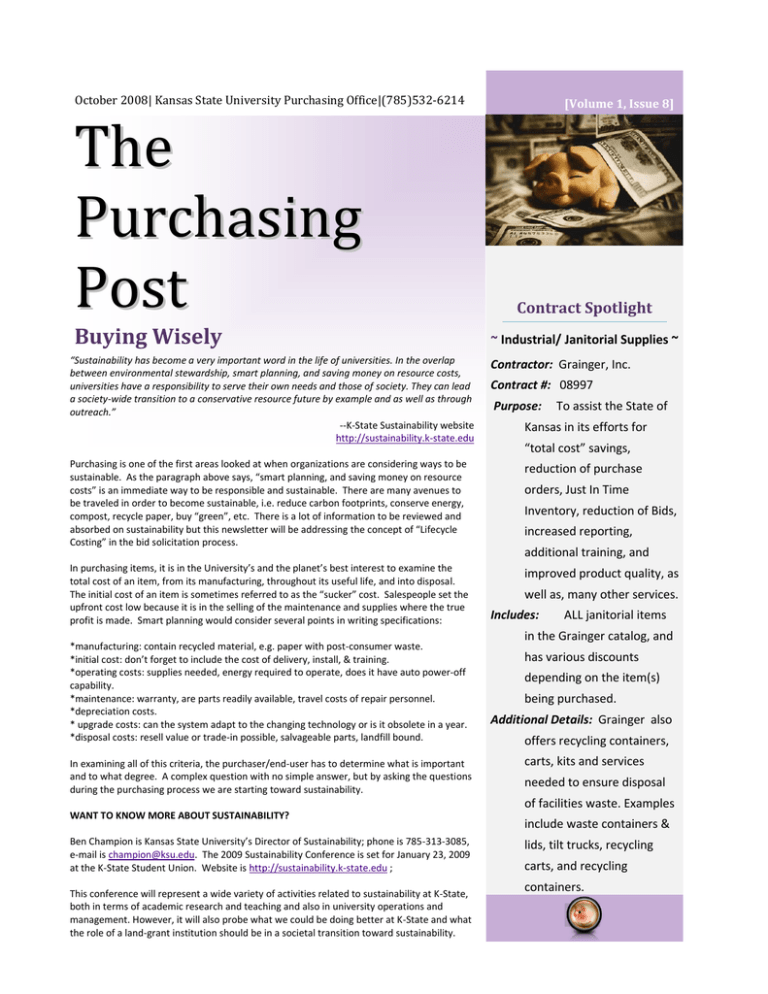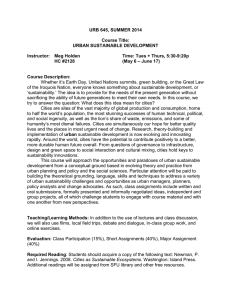Contract Spotlight
advertisement

October 2008| Kansas State University Purchasing Office|(785)532-6214 Th e Purchasing Post Buying Wisely “Sustainability has become a very important word in the life of universities. In the overlap between environmental stewardship, smart planning, and saving money on resource costs, universities have a responsibility to serve their own needs and those of society. They can lead a society-wide transition to a conservative resource future by example and as well as through outreach.” --K-State Sustainability website http://sustainability.k-state.edu [Volume 1, Issue 8] Contract Spotlight ~ Industrial/ Janitorial Supplies ~ Contractor: Grainger, Inc. Contract #: 08997 Purpose: To assist the State of Kansas in its efforts for “total cost” savings, Purchasing is one of the first areas looked at when organizations are considering ways to be sustainable. As the paragraph above says, “smart planning, and saving money on resource costs” is an immediate way to be responsible and sustainable. There are many avenues to be traveled in order to become sustainable, i.e. reduce carbon footprints, conserve energy, compost, recycle paper, buy “green”, etc. There is a lot of information to be reviewed and absorbed on sustainability but this newsletter will be addressing the concept of “Lifecycle Costing” in the bid solicitation process. reduction of purchase In purchasing items, it is in the University’s and the planet’s best interest to examine the total cost of an item, from its manufacturing, throughout its useful life, and into disposal. The initial cost of an item is sometimes referred to as the “sucker” cost. Salespeople set the upfront cost low because it is in the selling of the maintenance and supplies where the true profit is made. Smart planning would consider several points in writing specifications: improved product quality, as *manufacturing: contain recycled material, e.g. paper with post-consumer waste. *initial cost: don’t forget to include the cost of delivery, install, & training. *operating costs: supplies needed, energy required to operate, does it have auto power-off capability. *maintenance: warranty, are parts readily available, travel costs of repair personnel. *depreciation costs. * upgrade costs: can the system adapt to the changing technology or is it obsolete in a year. *disposal costs: resell value or trade-in possible, salvageable parts, landfill bound. In examining all of this criteria, the purchaser/end-user has to determine what is important and to what degree. A complex question with no simple answer, but by asking the questions during the purchasing process we are starting toward sustainability. orders, Just In Time Inventory, reduction of Bids, increased reporting, additional training, and well as, many other services. Includes: ALL janitorial items in the Grainger catalog, and has various discounts depending on the item(s) being purchased. Additional Details: Grainger also offers recycling containers, carts, kits and services needed to ensure disposal of facilities waste. Examples WANT TO KNOW MORE ABOUT SUSTAINABILITY? Ben Champion is Kansas State University’s Director of Sustainability; phone is 785-313-3085, e-mail is champion@ksu.edu. The 2009 Sustainability Conference is set for January 23, 2009 at the K-State Student Union. Website is http://sustainability.k-state.edu ; This conference will represent a wide variety of activities related to sustainability at K-State, both in terms of academic research and teaching and also in university operations and management. However, it will also probe what we could be doing better at K-State and what the role of a land-grant institution should be in a societal transition toward sustainability. include waste containers & lids, tilt trucks, recycling carts, and recycling containers.





